Text
Books I read in 2022
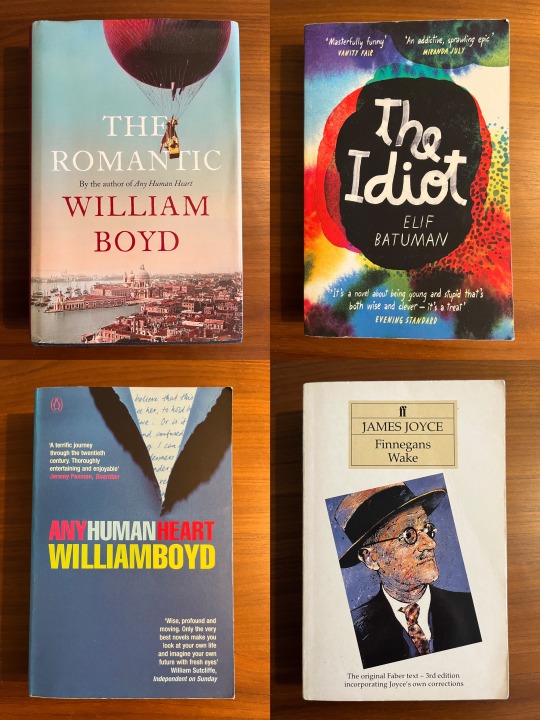
Normally I try to write an individual post about every book I read, but I didn’t manage that this year. So here is a montage of all the books I didn’t manage to post about!
I loved John Higgs’ book about The Beatles and James Bond and it was a real highlight to interview him this year for Your Own Personal Beatles. I also read John’s book William Blake vs the World, which was totally revelatory and made me feel like I understood Blake for the first time; I love the idea of Blake wandering around London and coming across the ‘large and pleasant’ village of Camberwell.
I reread Nineteen Eighty-Four, Animal Farm and Coming Up for Air for the Moon Under Water special we recorded for this year’s Orwell Festival. (I only noticed this time around that the appendix of Nineteen Eighty-Four is in the past tense, but apparently everyone has already spotted that.) I also read Dorian Lynskey’s ‘biography’ of Nineteen Eighty-Four, The Ministry of Truth, which brilliantly reckons with Orwell’s contradictions and explores the ways in which the novel has been misinterpreted and co-opted since it was published.
R. C. Sheriff’s The Fortnight in September is absolutely wonderful. A kind of Zen-like ambient novel in which a family goes on holiday to Bognor Regis – and that’s it. Similarly peril-free is Leonard and Hungry Paul, a hugely uplifting novel which is a welcome antidote to, well, everything.
I read some brilliant books about music: The Sound of Being Human by Jude Rogers is part memoir, part analysis of why music means so much to us. I found it incredibly moving. Denim and Leather by Michael Hann is an hilarious, rollicking account of a folk culture unique to our isles: The New Wave of British Heavy Metal.
We interviewed William Boyd for the Moon Under Water (episode coming soon) and it was a pleasure to read two of his ‘whole life’ novels, Any Human Heart and The Romantic.
2022 was the year in which I finally finished Finnegans Wake (started it in 2018 and kept a Twitter thread going for four years, in case you ever get really bored). Did I understand it? No, but I loved its musicality and glimmers of meaning in the dream-like gloom. Don’t we all?
Elif Batuman’s The Idiot was the best novel I read this year. The title character, Selin, a student at Harvard in the 1990s, is not an idiot – but she is a kind of holy fool. She’s actually incredibly perceptive at spotting other people’s idiocies and pretensions (of which student life has its fair share). Above all, The Idiot is really a novel about language; the way it conceals and reveals – and is full of glowing passages like this:
I kept thinking about the uneven quality of time – the way it was almost always so empty, and then with no warning came a few days that felt so dense and alive and real that it seemed indisputable that that was what life was, that its real nature had finally been revealed. But then time passed and unthinkably grew dead again, and it turned out that that fullness had been an aberration and might never come back.
Peter Doggett’s You Never Give Me Your Money is a superb Beatles book, and perfect if you watched Get Back and want to know what happened next. Why did The Beatles break up? Doggett has a 300-page answer for you.
The Plot is an engrossing literary thriller – although I did guess the twist. Reading Four Thousand Weeks felt like a waste of time (ironic for a time management book). I found it a bit trite, but some people loved it! More edifying was the children’s classic Carrie’s War, which is absolutely brilliant and surprisingly dark.
I ended the year by reading Salinger (again). As always, I’m amazed by how it feels like I’m back in a real place with real people whenever I read his books. I want to write something longer about The Catcher in the Rye because I think it’s one of the most profound books ever written. This time I wondered if it isn’t, in some way, about nostalgia. Holden is recalling the events of the novel a year after they happened and ends it by saying, ‘Don’t ever tell anybody anything. If you do, you start missing everybody.’
I finally got around to reading Actual Air. David Berman was a genius. His poems feel like the (mis)apprehensions of childhood – full of dream logic, strange familiarity and familiar strangeness. He was also incredibly funny, as in the poem where he meets a choreographer in New York who claims that blue jeans are ‘pretentious nineteenth-century gold rush period’ outfits.
Speaking of strangeness, I loved The Weird and the Eerie by Mark Fisher, a brilliant study of unsettling art, from Lovecraft to Lynch. Via this book I read what I think is one of the best short stories ever written, ‘The Door in the Wall’ by H. G. Wells – an extraordinary tale of lost childhood and unattainable desire:
‘That is as well as I can remember my vision of that garden – the garden that haunts me still. Of course, I can convey nothing of that indescribable quality of translucent unreality, that difference from the common things of experience that hung about it all; but that – that is what happened. If it was a dream, I am sure it was a daytime and altogether extraordinary dream…’

On top of these, I read the following books:
Eclipse – John Banville
Pond – Claire-Louise Bennett (again)
Dance Move – Wendy Erskine
Send Nudes – Saba Sams
Piranesi – Susanna Clarke
The Way by Swann’s – Marcel Proust
Unexhausted Time – Emily Berry
Transformer – Ezra Furman
Some Answers Without Questions – Lavinia Greenlaw
Adventures in the Skin Trade – Dylan Thomas
Small Things Like These – Claire Keegan
When We Cease to Understand the World – Benjamín Labatut
Leave the World Behind – Rumaan Alam
A Short Stay in Hell – Steven L. Peck
The Apparition Phase – William Maclean
So, a total of 37! Not bad going. Next year, I plan to do things a little bit differently and will probably say farewell to this Tumblr blog (which I started in 2011!). I'm hoping to write more long-form posts, so you may see me on Substack.
Thanks for reading and happy holidays.
6 notes
·
View notes
Photo

My albums of the year. No particular order, but Let’s Eat Grandma was my favourite.
Two Ribbons – Let’s Eat Grandma
Alluvium – C Duncan
Laurel Hell – Mitski
Lost & Found – Sean Shibe
Heartmind – Cass McCombs
Cheat Codes – Black Thought/Dangermouse
They Fear Us – Ithaca
Ghosted – Oren Ambarchi/Johan Berthling/Andreas Werliin
Cry Sugar – Hudson Mohawke
God’s Country – Chat Pile
Honourable mentions for Black Midi, Pusha T, Weyes Blood, Sudan Archives and lots more I’ve probably forgotten!
0 notes
Photo
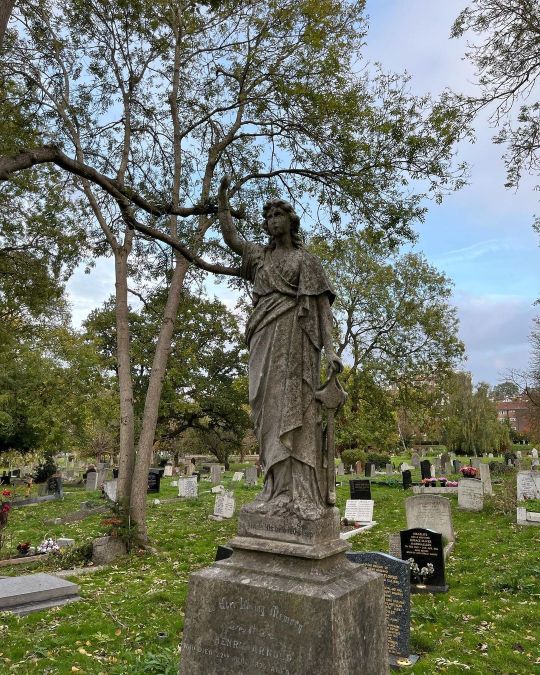
I’m really enjoying Eclipse by John Banville at the moment. I couldn’t find a high-res image of the cover so here is a picture of Camberwell cemetery.
Banville writes so beautifully; every sentence is an elegiac little poem: ‘Listening shadows hung in the high room.’ Occasionally it gets a bit much (but maybe deliberately so?). I feel like characters in Banville novels can never just go for a pint, they always have to attend the cromulent bar, imbibing libation after libation of effervescent pilsner, the shadows of the past etching themselves into the darkened corners of the inner pub. Both are pretty cool to be fair.
1 note
·
View note
Text
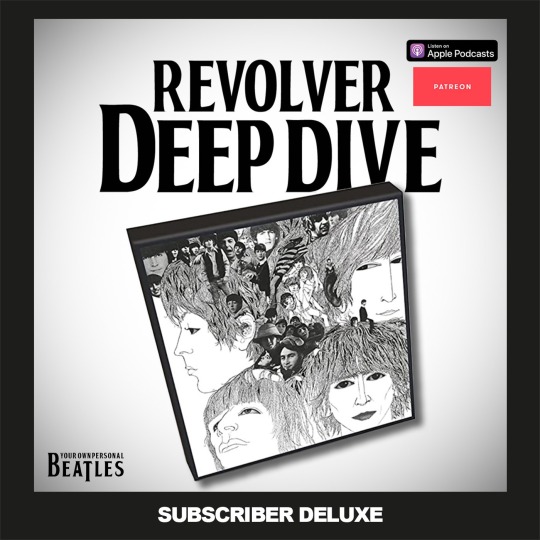
Brian Epstein’s death was the turning point from innocence to experience for the Beatles. In Get Back we saw the ‘experienced’ Beatles, still capable of the same magic, but growing up and growing apart; aware that the dream was coming to an end. The wintry sessions for the album that became Let it Be are a vivid contrast to the almost palpable sunshine of Sgt. Pepper. So, how powerful it is to come back to a more innocent time for the Beatles – 1966 and the recording of Revolver. Here the Beatles are getting along, collaborating, joking, laughing – captured at the toppermost of the poppermost, but almost blissfully unaware that that’s where they are. As soon as any awareness creeps in something of that magic has to go (and what’s more likely to make you self-conscious than a film crew documenting your every move?). The early takes and rehearsals captured on the Revolver Super Deluxe boxset are a kind of audio documentary in miniature of the making of the album – as vivid, if not as epic, as Get Back.
We hear John Lennon asking Paul McCartney to start playing an organ chord before the count-in of ‘Got to Get You Into My Life’ to avoid hearing the attack of the organ when the song starts. Frustrated at not being able to get his idea across, George Martin steps in, clarifying that during the mixing process they can, ‘just switch it in… so you don’t get the organ starting up,’ and then I’m sure he mumbles, ‘that’s what he means’. It’s such a beautiful moment, an illustration of the almost father-son relationship between John Lennon and George Martin, whose role often was to translate John’s ideas into reality. Then there’s the lovely moment when Ringo, exasperated with George Harrison’s inability to name his songs, shouts out that the song they’re working on (which would become ‘I Want to Tell You’) should be called ‘Granny Smith part frigging two!’ (a reference to the working title of ‘Love You To’ – ‘Granny Smith’). He then gently suggests, ‘“Tell You” that’s a nice title, “Tell You.”’ You just want to hug him. There’s something so generous and well meaning about the way he says it. Here is the Ringo we saw during Get Back: stoical, funny, kind, and in awe of his brothers.
The Super Deluxe boxset shows the Beatles slowing down for the first time – experimenting, working for hours to get a song just right (as in the perfect dual guitar lines of ‘And Your Bird Can Sing’). The result is an album that still feels like it has come from another place and that creates worlds of its own.
If you want to hear Jack Pelling and me go into far too much detail about the boxset, please check out the Patreon page for Your Own Personal Beatles.
1 note
·
View note
Photo
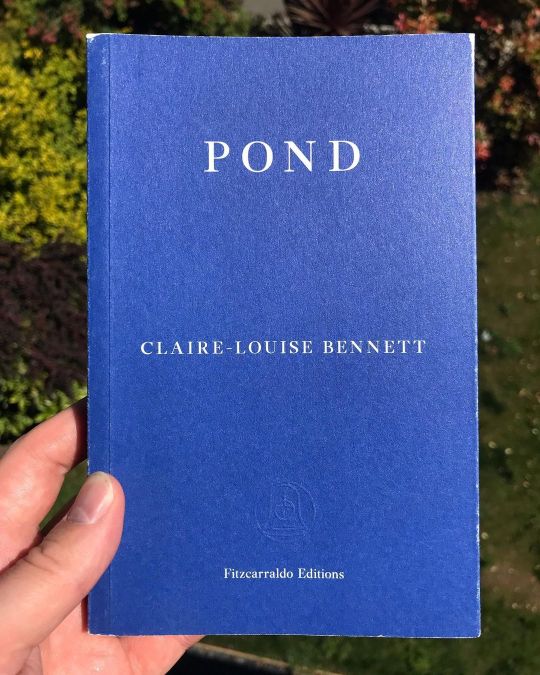
It was an absolute delight to reread Pond by Claire-Louise Bennett for the ‘Pub Library’ section of a recent Moon Under Water episode. There’s a great quotation from the literary critic M. W. Croll: ‘not a thought, but a mind thinking’. The poet Elizabeth Bishop latched on to this phrase because it represents a certain kind of poetic style that captures the nature of thought; the way the mind moves from one thing to another. Pond is written in this style, full of tangents and sudden breaks (‘none of this has anything to do with now whatsoever’), a true representation of the way a mind flits about and fizzes away. The novel is also very funny, verbose and knowing – reading it is like receiving a particularly insightful email from a friend. Actually, make that a letter, not an email. The narrator of Pond refers to the fact that she is writing it in longhand and you can kind of feel that as you read it. Time slows down as the language is drawn out and luxuriated in.
I cannot settle, and so I drink. I drink to you; I drink to me. I drink to plough and fortify a one-track mind and suddenly, briefly, the blood surrenders, shuffles through the old channels, and there is no such thing as a false move.
0 notes
Photo
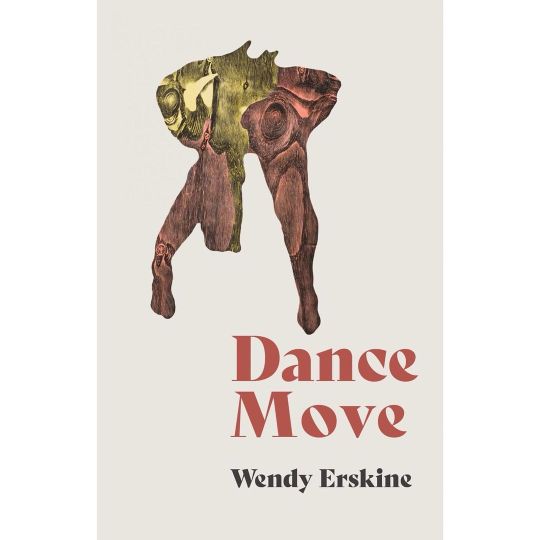
I recently finished two superb collections of short stories. Dance Move is Wendy Erskine’s second collection (Sweet Home is also excellent!). Erskine’s characters are so well drawn and she’s brilliantly observant about class, social status and unspoken hierarchies. Her stories are full of people living compromised lives; labouring under delusions or entertaining pretensions.
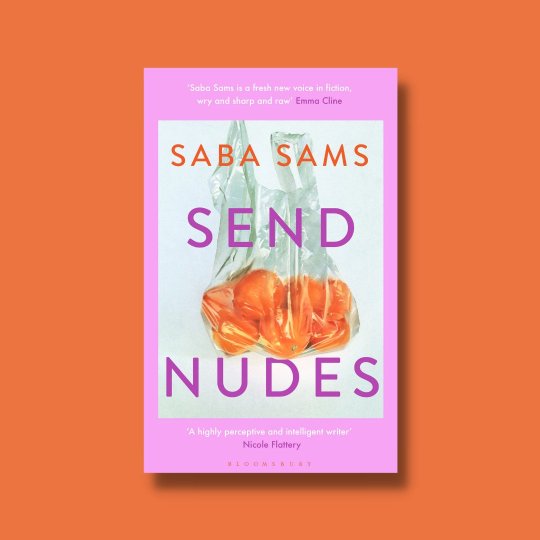
Send Nudes by Saba Sams is also bleakly brilliant. Ten dark and often very moving stories of innocence and experience.
0 notes
Photo
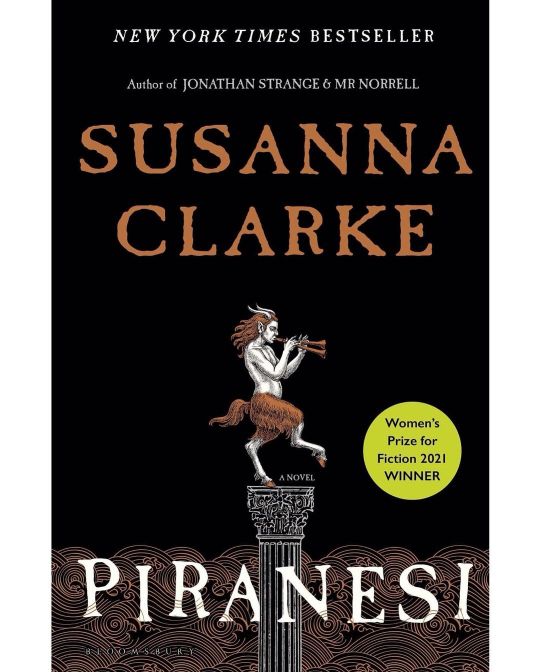
When the Moon rose in the Third Northern Hall I went to the Ninth Vestibule to witness the joining of three Tides.
So begins Susanna Clarke’s Piranesi. It’s hard to talk about without mentioning spoilers, but there’s something of Borges and of Gormenghast in the novel. Clarke’s world-building is quite extraordinary; the universe of Piranesi is a beautifully imagined space with a profound sense of mystery. My only criticism would be that the more the mystery is explained the less powerful it becomes. But I suppose we can’t expect to wander around an entire novel in a permanent state of confusion (although I probably would read a novel like that, if someone wants to write it). I’m nitpicking – Piranesi is a brilliant, unique novel.
10 notes
·
View notes
Photo
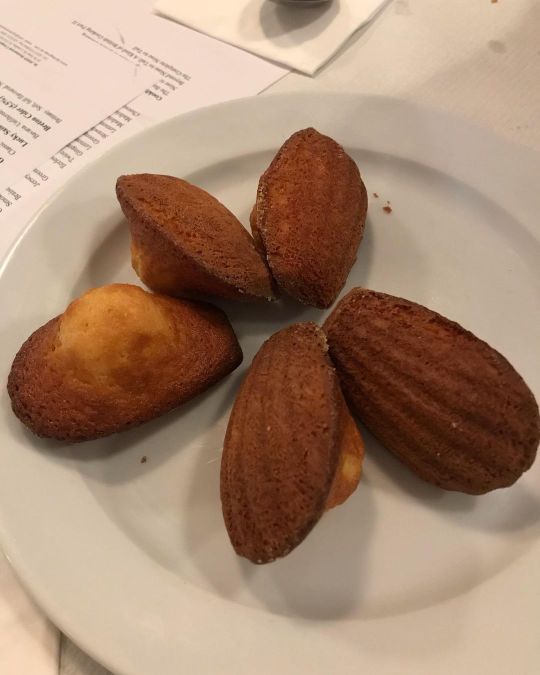
Here’s a picture of the delicious madeleines at St. JOHN in Smithfield to celebrate the fact that I have finished reading The Way by Swann’s, the first volume of Proust’s In Search of Lost Time (translated by Lydia Davis). (TLDR: eat a tea-soaked madeleine, remember stuff for 4000 pages.) I think it was one of the most amazing reading experiences of my life and I’m looking forward to slowly making my way through the whole thing. Just extraordinary writing about memory and music – and about how we experience life in two distinct ways: as we live through it and as we remember it. Or, as my friend Sam Wisternoff once wrote in a song, ‘a minute with you is an hour in my head the next day’.
Anyway, how’s this for a description of nostalgia:
what a contradiction it is to search in reality for memory’s pictures, which would never have the charm that comes to them from memory itself and from not being perceived by the senses. The reality I had known no longer existed. […] The places we have known do not belong solely to the world of space in which we situate them for our greater convenience. They were only a thin slice among contiguous impressions that formed our life at that time; the memory of a certain image is only regret for a certain moment; and houses, roads, avenues are as fleeting, alas, as the years.
P. S. Thanks to my friend Tom Wilson for encouraging (demanding) that I finally read it!
0 notes
Photo
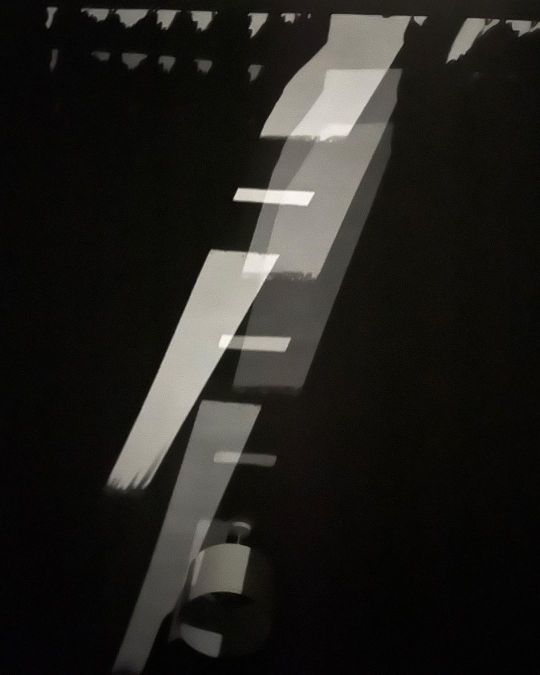
I really enjoyed Emily Berry’s collection of poems Unexhausted Time, particularly ‘Ghosts (Homage to Burial)’, which is made up entirely of quotations from a Burial interview with Mark Fisher. I couldn’t find a decent image of the cover online so here is a photo of some moonbeams peeking through the curtains onto the bedroom ceiling. Anyway, this is a prose poem from Unexhausted Time called ‘Street’:
Walking along the street one afternoon I found myself abreast of another pedestrian who, for whatever reasons, perhaps the same as my own, could not bring themselves to generate a surge in pace sufficient to overtake me. So we continued in that way for some time, almost companionably, and when at last something did compel them to break away I felt a pact had been torn and I knew once and for all that my worst fears were true: I was all alone in the world and no one could save me.
0 notes
Photo

It was an absolute pleasure to talk to Ezra Furman for this week’s Moon Under Water podcast. Check out their brilliant new single Point Me Toward the Real – and I really cannot recommend their superb 33 1/3 book about Lou Reed’s Transformer highly enough. Some of the best music writing I’ve ever read; it’s a book that grapples with the multiplicities of a great artist/terrible person and celebrates the album’s profound ambiguity.
A song is a bad place to hide. Songs are always built to reveal their authors’ inner lives – it’s inherent to the form. You can dress your song up in jokey costumes, bury it in noise, or fill it with lies, but if you dare to sing it, you will reveal things about yourself. Having spent years trying it a million different ways, I’ve learned this beyond a doubt. Singing is confession.

1 note
·
View note
Photo

This is a beautiful meditation on music and writing. Occasionally it did remind me of the Twitter account ‘If plumbers spoke like writers’, in which some of the more self-regarding observations made by authors about their ‘craft’ have had the word ‘writing’ replaced with ‘plumbing’, e.g.: ‘My plumbing is an exaltation. A celebration of the fundamentals of humanity.’ Greenlaw does stray into this territory at times: ‘When I’m not plumbing, I sense its pull. I can’t hear what other people are saying or make space for other worlds. There’s an impatience to get back to it and a resentment of all that stands in its way. I feel the weight of it, its gnawing nature, constantly.’ But this is to an immense disservice to a book that is truly profound:
I didn’t yet understand that the home you leave behind, the one you grew up in, travels ahead and is always there in some form to greet you.
And I don’t think this description of reading can be bettered:
It’s an experience of finding yourself simultaneously elsewhere and travelling your own nature. It is also the enactment of a desire to be quiet. The book in your hands gives you permission to remain silent and alone. How much reading time is spent dreaming?
0 notes
Photo
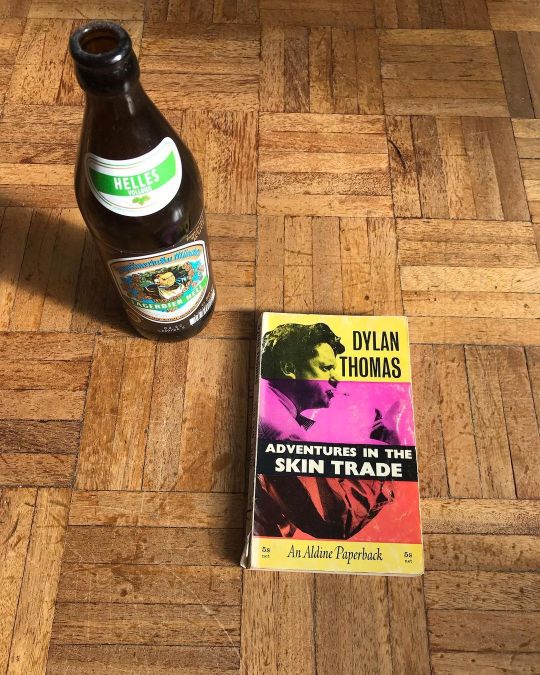
Whenever people ask for recommendations of genuinely funny books I always suggest Adventures in the Skin Trade by Dylan Thomas (along with An Evening of Long Goodbyes by Paul Murray and The Timewaster Diaries by Robin Cooper/Robert Popper). Adventures in the Skin Trade is a fascinating and tantalising oddity in some ways; under-rated and unfinished, it’s the closest we have to a Dylan Thomas novel.
The comedy comes from the bathos of provincial life, from which our very Dylan Thomas-esque hero Samuel Bennet escapes, and the self-aggrandisement of youth (maybe this is why I liked the book so much as a teenager). There are also some very funny, sitcom-style scenes in which imaginary conversations are interpolated into the narrative by Samuel. Before leaving for London his mother instructs him to find a nice room – ‘Don’t forget to look under the wallpaper for bugs.’ We cut to Sam interviewing a potential landlady: ‘Has it got bugs?’ ‘All over the walls, praise be to God.’ ‘I’ll take it.’
Adventures in the Skin Trade also captures brilliantly the experience of being a wide-eyed naïf, cast adrift in London for the first time:
Look at London flying by me, buses and glow-worms, umbrellas and lamp posts, cigarettes and eyes under the water doorways, I am dancing with three strangers down Edgware Road in the rain, cried Samuel to the gliding boy around him. Light and without will as a suit of feathers, he held on to their arms, and the umbrella rode above them like a bird.
I wasn’t able to find a bottle of Bass (Samuel spends most of the novel with one stuck on his finger), so I made do with a bottle of Augustiner Helles.
0 notes
Photo
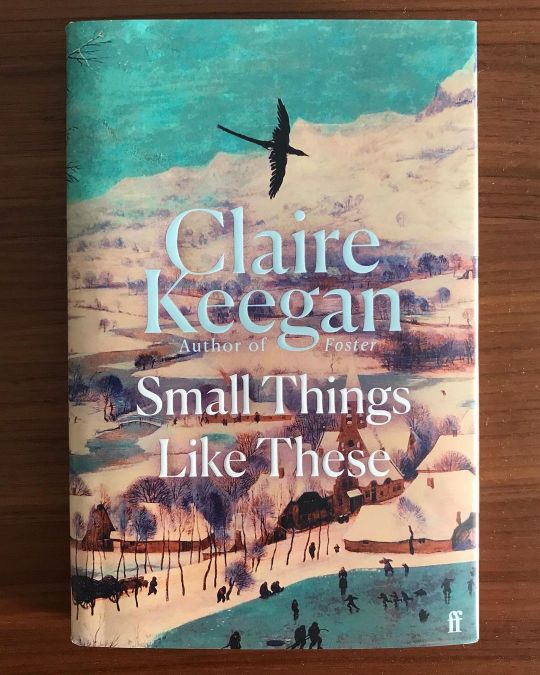
A longing to get away came over him and he imagined himself being out in his old clothes on his own, walking the length of a dark field.
Small Things Like These is a masterpiece of concision, its brevity belies its emotional and moral depth.
Last week I posted about Benjamín Labatut’s When We Cease to Understand the World and a friend asked me what I thought of it. My feeling is that I loved it when it was most like a novel, but had an issue with the more Sapiens-esque, pop-science elements of the book. The problem for me was that because the scientific ideas that Labatut writes about are so complicated he has to resort to metaphors to describe them: ‘He formulated his ideas by removing one layer after the other, breaking down concepts, simplifying and abstracting until there seemed to be nothing left; there, in that apparent vacuum, he would discover the structures he had been searching for.’ That’s all very lovely, but does that sentence actually mean anything? Does it convey what was so significant about Grothendieck’s work? When We Cease to Understand the World ended up reminding me of The Theory of Everything, the film about Stephen Hawking that came out a few years ago. The film-makers were unable to explore Hawking’s work in any real depth because it’s just too complicated, so they just used montages of him scribbling on a blackboard.
I finished the book feeling not much wiser but maybe a little bit more exhausted by the cliché of the tortured male genius.
0 notes
Photo
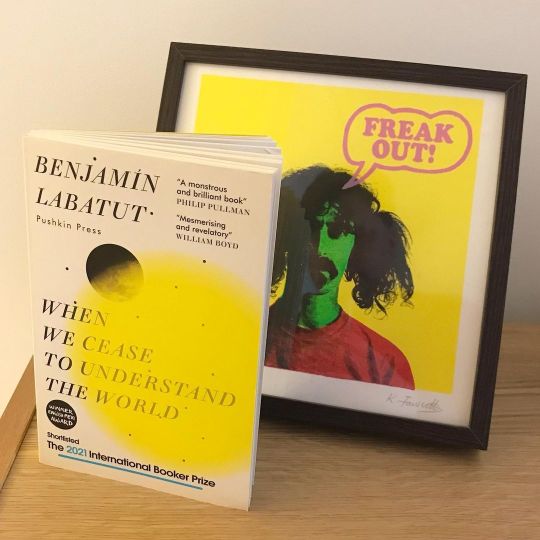
What [Heisenberg] had achieved had no precedents: it was like deducing all the rules of Wimbledon – the number of sets, the length of the grass, the tension of the nets and even the mandatory white that players have to wear – from the few balls that flew out of the stadium, without ever having witnessed what takes place on the court.
0 notes
Photo
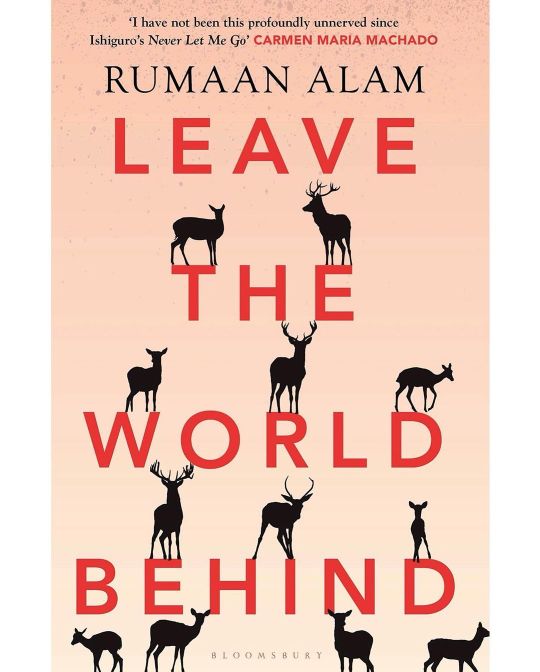
‘You’ll believe it when you can see it on your phone.’ Ruth didn’t even blame her for this. All these years debating the objectivity of fact had done something to everyone’s brains.
If you’re looking for some escapism at the moment I would not recommend reading a book about the end of the world. I don’t think I’ve been so wracked with worry while reading a novel since I read The Road. The apocalypse in Leave the World Behind is a technological one. What would happen if all the gadgets and machines that we rely on suddenly stopped working? As such, it’s a very good satire about the power that technology has over us and the novel explores how the line between the virtual and the real has become so blurred that it’s sometimes hard to tell the difference. For instance, the other day I answered the door to a delivery man. He was pointing at the screen of his GPS device, which showed a flashing blue dot in the next street. He said, ‘Amazon says you’re here.’ ‘But I’m here,’ I said and sort of pointed at the ground, feeling suddenly unsure of myself and more and more like a flashing blue dot. The man looked at me doubtfully and handed me the package.
0 notes
Photo
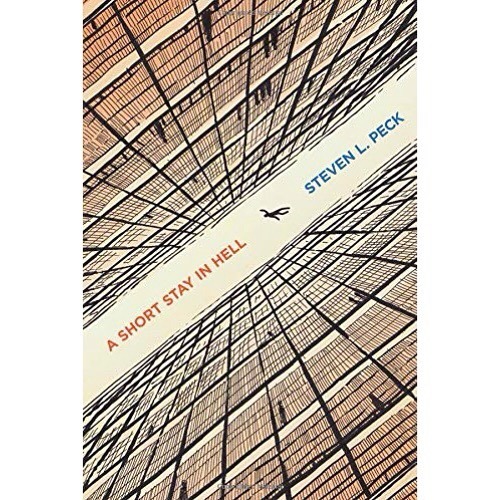
A Short Stay in Hell is a brilliant retelling of Borges’ short story ‘The Library of Babel’, in which Steven L. Peck imagines the afterlife as a near infinite library of books containing every possible combination of letters and punctuation. To escape you need to find the book which contains the story of your life. Perhaps less poetic than Borges’ library, whose books contain beautiful found poems (‘Combed Thunder’; ‘O time thy pyramids’), Peck’s story is more of a scientific enquiry into the library; just how big would it be and what would happen to human consciousness over the unimaginable length of time it would take to find your book? Peck’s library is so vast that if you jumped over the balcony you would be falling for millions of years before you hit the ground floor. He explores the human capacity for violence and madness, as well as the human instinct for love and connection – and he taps into what feels like a primal fear of very big numbers. It’s by turns funny, touching and absolutely horrifying.
0 notes
Photo
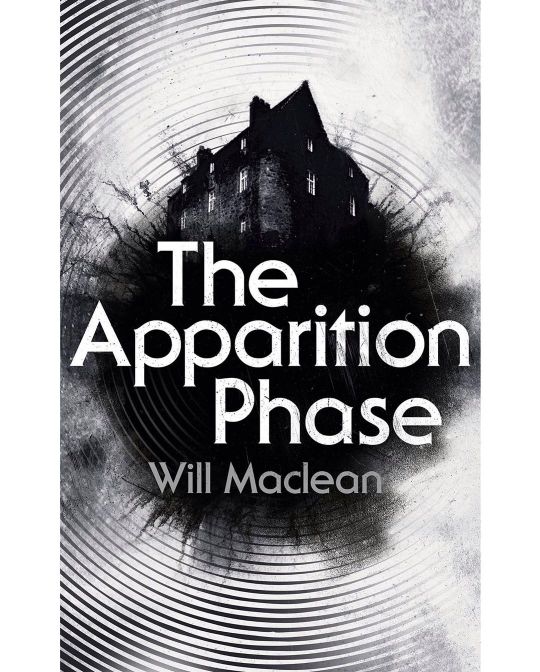
The first book I finished this year was The Apparition Phase by Will Maclean, a ghost story set in the 1970s and rich with period detail: fag smoke, LPs by Leaf Hound, The Stone Tape on TV and anaglypta wallpaper. If you enjoyed the brilliant Uncanny podcast, I think you’ll really like this. Like Uncanny, it’s about the phenomenon of paranormal activity; real or not, why do we see ghosts? Trauma? Folie à deux? Spoiler alert: there’s plenty of ambiguity and genuine frights along the way!
I was sad to finish it – and also sad not to be able to share it with Nick Talbot, as this would have been very up his hauntological street.
0 notes